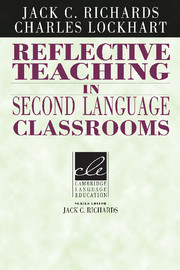Book contents
- Frontmatter
- Contents
- Series editor's preface
- Preface
- Introduction: Teacher development through exploring classroom processes
- 1 Approaches to classroom investigation in teaching
- 2 Exploring teachers' beliefs
- 3 Focus on the learner
- 4 Teacher decision making
- 5 The role of the teacher
- 6 The structure of a language lesson
- 7 Interaction in the second language classroom
- 8 The nature of language learning activities
- 9 Language use in the classroom
- Epilogue
- References
- Index
4 - Teacher decision making
Published online by Cambridge University Press: 29 January 2010
- Frontmatter
- Contents
- Series editor's preface
- Preface
- Introduction: Teacher development through exploring classroom processes
- 1 Approaches to classroom investigation in teaching
- 2 Exploring teachers' beliefs
- 3 Focus on the learner
- 4 Teacher decision making
- 5 The role of the teacher
- 6 The structure of a language lesson
- 7 Interaction in the second language classroom
- 8 The nature of language learning activities
- 9 Language use in the classroom
- Epilogue
- References
- Index
Summary
Chapter 2 examined the role that beliefs play in shaping the instructional decisions and practices that teachers make use of in teaching. This chapter examines the nature of teacher decision making in more detail and the effects of these decisions on teaching and learning. For many educationists, decision making is viewed as an essential teaching competency. Shavelson (1973: 143–5) observed:
Any teaching act is the result of a decision, either conscious or unconscious … What distinguishes the exceptional teacher is not the ability to ask, say, a higher-order question, but the ability to decide when to ask such a question.
From this perspective, teaching is essentially a thinking process. Teachers are constantly confronted with a range of different options and are required to select from among these options the ones they think are best suited to a particular goal. The option the teacher selects is known as a decision (Kindsvatter, Wilen, and Ishler 1988). Teaching involves making a great number of individual decisions. Before a lesson can be taught it must be planned. Decisions at this stage are called planning decisions. During the lesson itself, another level of decision making is involved. The teacher has to make on-the-spot decisions concerning different aspects of the lesson, many of which may not have been planned. These are known as interactive decisions. After the lesson, the teacher must make decisions about its effectiveness and what the follow-up to the lesson will be. These are known as evaluative decisions. These three types of decisions form the focus of this chapter.
- Type
- Chapter
- Information
- Reflective Teaching in Second Language Classrooms , pp. 78 - 96Publisher: Cambridge University PressPrint publication year: 1994



